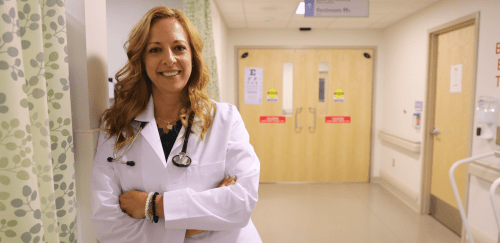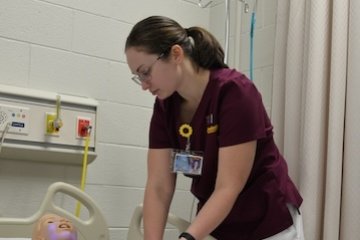
Nursing (DNP): Advanced Practice
Elevate your clinical and leadership experience with Commonwealth University's online, Nursing (DNP): Advanced Practice degree.
- Degrees & Offerings
-
- Concentration
- Location
-
- Online
- Department
- Program Contact
-
Assistant Professor of Nursing
Pursuing a DNP Advanced Practice program offers several valuable benefits for experienced nurse practitioners (NPs) and other advanced practice nurses, such as clinical expertise, leadership and management skills, improved patient outcomes, higher earning potential, expanded scope of practice, teaching opportunities, and personal growth.
Program Details
- Program Focus: The Advanced Practice track is practice-oriented investigation in the clinical setting emphasizing health education, leadership, research application, and analysis of health care outcomes.
- Program Delivery: Coursework is 100% online. Core courses are asynchronous and clinical courses are synchronous.
- Curriculum: Consists of 29 credits to be completed over 2 years.
- Flexible Coursework: Curriculum is built with working nurses in mind.
- Faculty Expertise: Program faculty are advanced practice nurses.
- Clinical Hours: 500 required clinical hours are required to be completed (APN students are credited 500 hours from clinical hours completed during their MSN program) that are incorporated into coursework.
- Evidence-Based Project: Students complete an evidence-based, quality improvement project that develops with progression through the program.
- Start Date: Applications are accepted for the Summer semester.
- Affordability: Our DNP program is recognized as one of the most affordable options in the field! To help you plan ahead, we also offer a Cost Estimator Tool that gives you a preview of your investment.
Courses and Curriculum

Benefits of the DNP
→ Enhanced Clinical Skills: A DNP in Advanced Practice equips you with comprehensive clinical skills, allowing you to provide high-quality care in various healthcare settings.
→ Leadership Opportunities: This degree prepares you for leadership roles in healthcare, enabling you to influence patient outcomes and healthcare policies effectively.
→ Research and Evidence-Based Practice: You'll gain valuable experience in research and the application of evidence-based practices, both critical components in advancing the nursing profession.
→ Job Market Demand: There is a growing demand for highly trained advanced practice nurses. A DNP can open doors to more specialized and higher-paying positions.
ONWARD AND UPWARD
Careers
Graduates will be prepared to assume a higher level of responsibility and leadership in nursing and healthcare, with the goal of improving the healthcare delivery system of the nation.
Potential Job Opportunities
- Health Care Executive
- Nurse Manager
- Nursing Faculty
- Advanced Practice Nurse
- Health Care Lobbyist
- Clinical Care Researcher

Making Education Affordable
At Commonwealth, you can spend more time making your way up the ladder and less time paying down the loans. We were founded on the idea of giving hardworking people an affordable, world-class education. And we’re still committed to that vision today, in every single way.
Applying to Graduate Programs
Apply
-
Application Process
Review the step-by-step application process for graduate school at Commonwealth University.
-
Apply Now
By starting your application, you gain access to your personalized application portal to view your progress.
-
Contact Us
If you have questions, we have answers. Contact us today!
Explore More
-
Grad Assistantships
Help finance your grad degree. Gain professional experience. Grow your network.
-
Tuition and Fees
Earning an advanced degree is an investment in your future. See just how affordable a graduate degree can be for you.
-
Understanding Financial Aid
Our Financial Aid team is your guide to navigating the aid process for your graduate degree.



